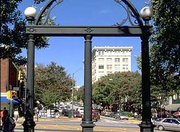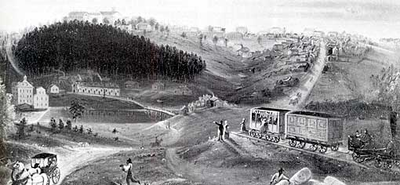Athens, Georgia
|
|
Athens or Athens-Clarke County is a city located in Clarke County,Georgia, U.S., in the northeastern part of the state, just off of Georgia 316. As of the 2000 census, the consolidated city-county (including all unincorporated areas in Clarke County except Winterville) had a total population of 100,266, although this does not include all of the college students with temporary residences. It is home to the University of Georgia, a major educational institution in the South and a football powerhouse in the Southeastern Conference. The city was particularly known for its music scene in the 1980s, being home to such bands as R.E.M., The B-52's, and Widespread Panic.
| Contents |
History
In the late 18th century, a trading settlement on the banks of the Oconee River called Cedar Shoals stood where Athens is located today. On January 27, 1785, the Georgia General Assembly granted a charter by Abraham Baldwin for the University of Georgia as the first state-supported university. Sixteen years later, in 1801, a committee from the university's board of trustees selected a site for the university on a hill above Cedar Shoals in what was then Jackson County. On July 25, John Milledge, one of the trustees and later governor of Georgia, bought 633 acres (2.6 km²) from Daniel Easley and donated it to the university. Milledge named the surrounding area Athens after the city that was home to the academy of Plato and Aristotle in ancient Greece.
The first building built was named Franklin College in honor of Ben Franklin and is now called Old College. The town grew as lots adjacent to the college were sold to raise money for the additional construction of the school. By the time the first class graduated from the University in 1804, Athens consisted of three homes, three stores and a few other buildings facing Front Street, now known as Broad Street.
Athens officially became a town in December 1806 with a government made up of a three-member commission. The university continued to grow, but so did the town, with cotton mills fueling the industrial and commercial development. Athens became known as the "Manchester of the South" after the city in England known for its mills. In 1841, railroad lines were laid through Athens, expanding the commercial development and connecting the city with Atlanta to the west and Greenville, South Carolina to the north.
During the American Civil War, William T. Sherman's Union army concentrated on Atlanta, cutting off the rail lines to prevent Athens from resupplying the besieged city. After burning Atlanta, the Union army largely ignored Athens in the March to the Sea, instead turning southeast to Savannah, Georgia.
During Reconstruction, Athens continued to grow. The form of government changed to a mayor-council government with a new city charter on August 24, 1872. Freed slaves moved to the city, many attracted by the new centers for education such as the Freedman's Bureau. This new population was served by three black newpapers - the Athens Blade, the Athens Clipper, and the Progressive Era.
As Athens became a more populous city in the 1880s, city services and improvements were undertaken. The Athens Police Department was founded in 1881 and public schools opened in fall of 1886. Telephone service was introduced in 1882 by the Bell Telephone Company. Transportation improvements were also introduced with a street paving program beginning in 1885 and streetcars, pulled by mules, in 1888.
By its centennial in 1901, Athens was a much-changed city. A new city hall was completed in 1904. An African-American middle class and professional class had grown around the corner of Washington and Hull Streets, known as the "Hot Corner." The theater at the Morton Building hosted movies and performances by well-known black musicians such as Louis Armstrong, Cab Calloway, and Duke Ellington. Athens got its first tall building in 1908 with the seven-story Southern Mutual Insurance Company building.
During World War II, the U.S. Navy built new buildings and paved runways to serve as a training facility for naval pilots. In 1961, Athens witnessed part of the Civil Rights movement when Charlayne Hunter and Hamilton Holmes became the first two black students to enter the University of Georgia. The Athens music scene grew in the early 1970s with Ravenstone, a regionally popular band sometimes called "one of the godfathers of Athens rock," and later during the 80s with R.E.M. and the B-52's scoring breakout hits. Athens became a unified government with Clarke County, Georgia in 1990.
Geography
GAMap-doton-Athens.PNG
Location of Athens, Georgia
Athens is located at 33°57'19" North, 83°22'59" West (33.955464, -83.383245)Template:GR.
According to the United States Census Bureau, the balance has a total area of 306.2 km² (118.2 mi²). 305.0 km² (117.8 mi²) of it is land and 1.2 km² (0.5 mi²) of it is water. The total area is 0.41% water.
Demographics
As of the censusTemplate:GR of 2000, there are 100,266 people, 39,239 households, and 19,344 families residing in the city. The population density is 328.8/km² (851.5/mi²). There are 41,633 housing units at an average density of 136.5/km² (353.6/mi²). The racial makeup of the city is 64.71% White, 27.37% Black or African American, 0.21% Native American, 3.15% Asian, 0.04% Pacific Islander, 3.11% from other races, and 1.41% from two or more races. 6.39% of the population are Hispanic or Latino of any race.
There are 39,239 households out of which 22.3% have children under the age of 18 living with them, 32.3% are married couples living together, 13.3% have a female householder with no husband present, and 50.7% are non-families. 29.9% of all households are made up of individuals and 5.8% have someone living alone who is 65 years of age or older. The average household size is 2.35 and the average family size is 2.95.
In the city the population is spread out with 17.8% under the age of 18, 31.6% from 18 to 24, 27.3% from 25 to 44, 15.3% from 45 to 64, and 8.0% who are 65 years of age or older. The median age is 25 years. For every 100 females there are 95.4 males. For every 100 females age 18 and over, there are 93.4 males.
The median income for a household in the city is $28,118, and the median income for a family is $41,407. Males have a median income of $30,359 versus $23,039 for females. The per capita income for the balance is $17,103. 28.6% of the population and 15.0% of families are below the poverty line. Out of the total population, 25.2% of those under the age of 18 and 13.5% of those 65 and older are living below the poverty line.
External links
- University of Georgia Libraries: On Athens-Clarke County (http://www.libs.uga.edu/athens/)
- OnlineAthens : Athens, Georgia News (http://www.onlineathens.com/)
- Athens-Clarke County : Unified City/County Government (http://www.athensclarkecounty.com/)
Template:Mapit-US-cityscalede:Athens (Georgia) es:Athens (Georgia, Estados Unidos) sv:Athens, Georgia


